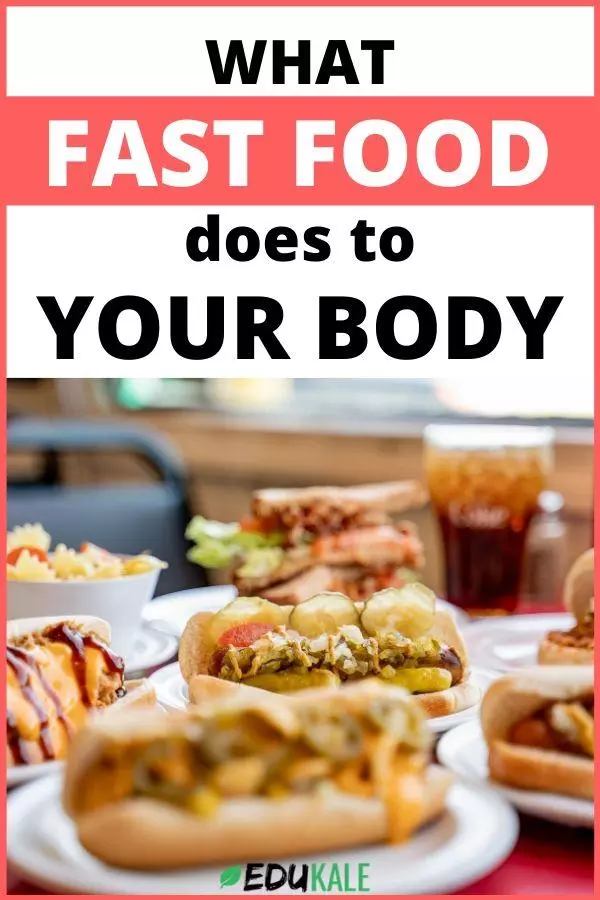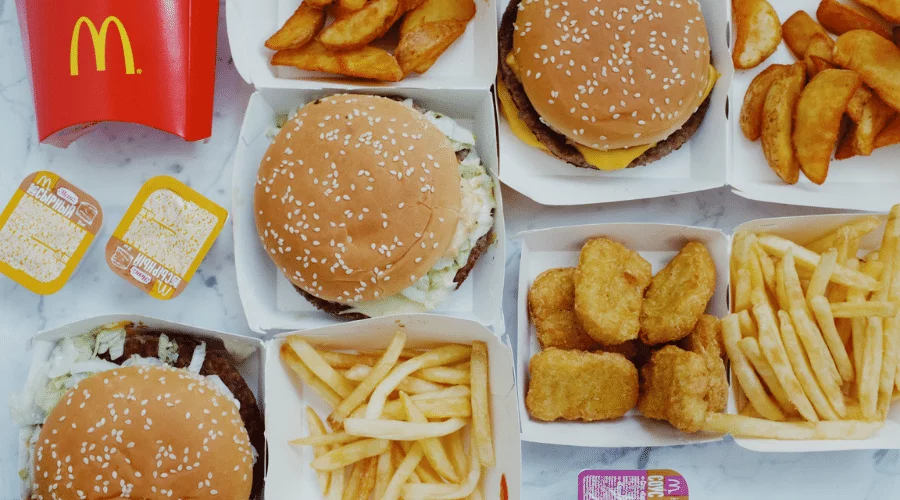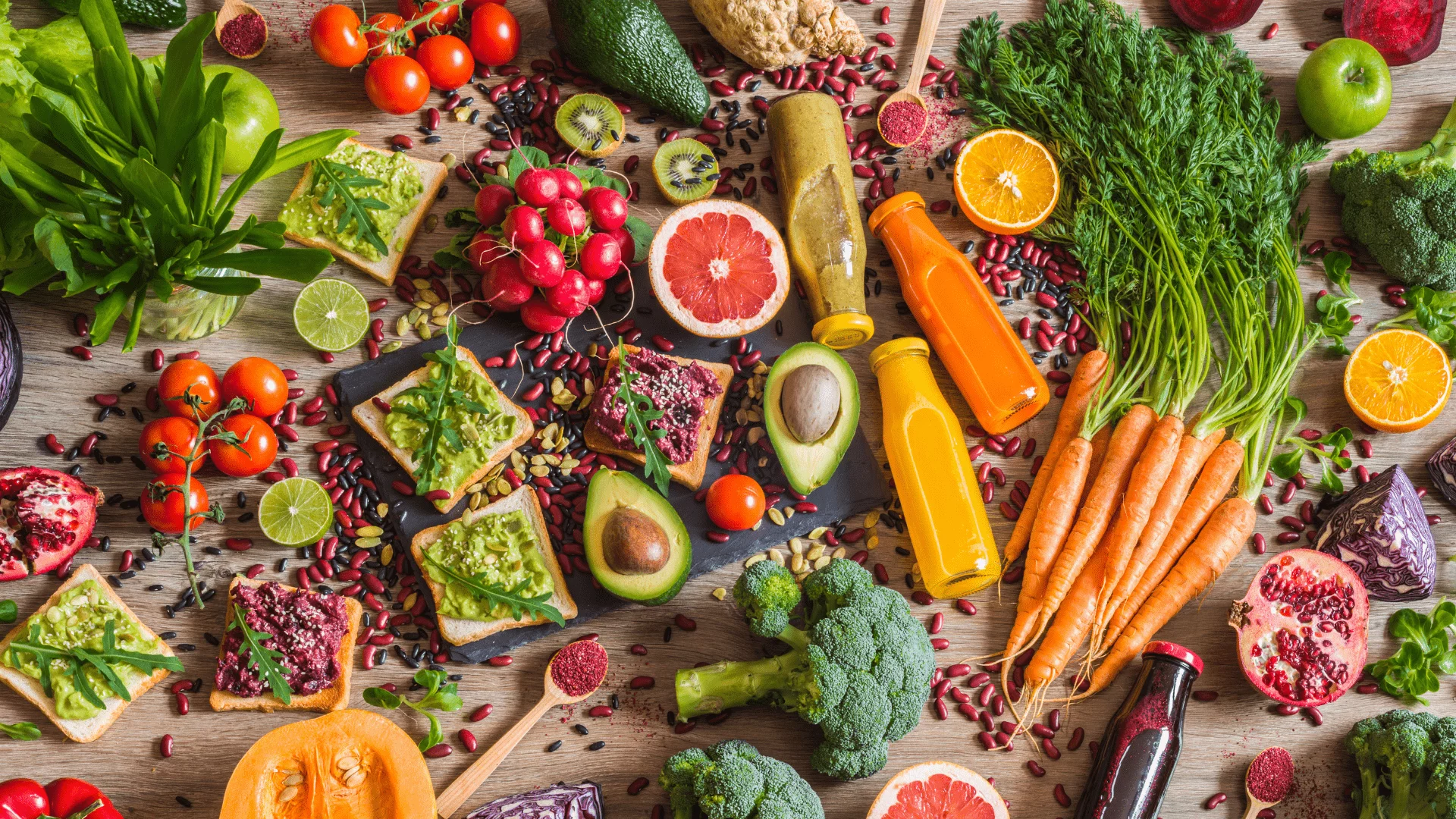This post contains affiliate links from which I may receive a small commission, at no extra cost to you. In no way does this affect my opinion or the information I provide on the product. Please read my disclaimer for more info.
Who doesn’t have fast food more than they should?
It’s cheap, easy, and tastes so good. You know that it’s bad for you, but you just can’t stop yourself.
Nothing to eat in your house? Fast food.
Too lazy to cook? Fast food.
Feeling down? Fast food.
And yes, I’ll have fries and coke with that burger.
Fast food is so addicting. While the occasional fast food won’t hurt, making it a habit could have more severe consequences.
Wondering how fast food really affects your body?

What is fast food?
Fast food is a processed food that is easily prepared and can be eaten quickly. In most cases, it’s also junk food, meaning that it is highly processed, calorie-dense, and low in nutrients.
Even if some healthy fast foods are emerging (such as salad bars, for instance) the majority is still pretty bad.
How fast food really affects your body
1. It affects your digestive system
Fast food is very often loaded with carbohydrates. Now don’t get me wrong, the right type of carbs are absolutely beneficial to your health.
However, the ones found in fast food aren’t that great. They come from added sugars, which will cause your glucose levels and insulin to spike.
Good carbs often contain fiber, which slows down the sugar absorption rate. Fiber is also great for your digestive system and promotes bowel health.

Guess which carbs don’t contain fiber though? That’s right, the refined carbs found in burgers, sodas, and sundaes.
A lack of fiber can cause constipation, stomach pain, and inflammation. It also drastically reduces your healthy gut bacteria. If you want to avoid this, make sure to eat foods from this high-fiber foods list.
2. It can cause bloating and high blood pressure
Most fast foods contain too much sodium (from salt) to make it tastier. However, this can cause water retention and make you feel bloated and puffy.
Worse, ingesting too much salt can have more severe consequences, such as causing high blood pressure. This can be a risk factor for heart disease.
You shouldn’t consume more than 5 grams of salt a day (2 grams of sodium). Most people consume double that amount, however, and a fast-food meal can easily give you your day’s worth of sodium.
3. It increases your risk of heart disease
Fast food consumption has been shown to increase the risk of cardiovascular disease.
Indeed, fast food is often loaded with fats, and not the healthy kind. Trans fats are abundant in fast food products and raise the “bad” LDL to “good” HDL cholesterol ratio.
This a risk factor for heart disease, because the “bad” cholesterol can build up in your arteries, narrowing the blood flow to your heart.
Fast food is also high in saturated fats, whose effect isn’t as clear. While they are seen as unhealthy because they raise cholesterol levels, this study found that they weren’t associated with an increased risk of heart disease. This review showed that reducing saturated fat intake had little effect on different health factors.
However, it’s apparently a useful strategy to replace saturated fats with polyunsaturated fats. Even if saturated fats aren’t the devil, over-consuming them isn’t advised.
4. It’s a risk factor for type II diabetes
Fast food is also linked to type II diabetes. As mentioned previously, fast food contains way too many trans fats and refined carbs.
The fat can bind to insulin receptors and prevent them from opening correctly. The excess sugar may also be too much to handle— after producing more and more insulin in hopes of getting all that sugar in, your pancreas can no longer keep up the pace.
This can lead to insulin resistance, meaning that your body won’t acknowledge the signals of insulin telling it to bring the glucose into your cells, or just won’t produce enough insulin.
This will cause your blood sugar to start rising, and you can develop type II diabetes.
5. It contributes to obesity
Studies 1 2 3 have often linked the consumption of fast food to weight gain and obesity.
There are a few reasons why eating too much fast food can cause you to gain weight.
First, these foods are often very calorie-dense, and the portion sizes excessive. You can wolf down a burger with 2 steaks, a side of fries, a can of coke, and an ice-cream sundae in a few minutes, and get over half your day’s worth of calories.

While you’ll certainly feel full right after, the feeling likely won’t last. For one, there are very little nutrients in fast food, and your body will soon start to crave proper nourishment.
In addition, these foods lack fiber, which takes up room in your stomach and slows down digestion, helping you feel fuller for longer. You’ll end feeling very hungry for your next meal, so you’ll be likely to over-eat during that one as well.
Fast food is also bad for your gut microbiome (healthy bacteria), and studies have shown that our microbiome plays a role in maintaining a healthy weight.
These foods are also super addicting, so the more you eat them the more you’ll crave them, the more weight you’ll gain. Their low price and convenience push you to consume them more than you should, fueling this cycle as well.
How fast food affects your body in conclusion.
It comes as no surprise that fast food isn’t the healthiest option.
It impacts your digestive system, causes bloating, increases your risks of high blood pressure, heart disease, and diabetes, and greatly contributes to obesity.
However, having fast food once in a while is ok and shouldn’t be demonized, either. As long as most of your meals are healthy and balanced, your body will deal with the occasional fast food meal just fine!
-Lucie
If you’re interested in nutrition, its impact on our health, and the science behind it, you should definitely read How Not to Die. In this book, Doctor Michael Greger, founder of Nutrition Facts, examines the top causes of death in America and explains how your diet can prevent— and in some cases even reverse— them. His advice is all backed by science and he writes in a very clear and entertaining way. This book isn’t a list of what you already know. It will teach you the keys to living a long healthy life, in a simple and practical way, and without spending fortunes on supplements and pills!
PLUS if you want to take it a step further, you can check out the How Not to Die Cookbook to implement the advice easily!

Welcome!
I'm Lucie, the nutritionist behind Edukale! If you'd like to learn more about me, click HERE !
Read More!

The truth about processed foods
You’ve probably heard that it’s best to reduce your intake of “processed foods” for healthy eating, and increase your intake of whole foods for optimal health.

The Best Foods to Fight Fatigue
Do you feel like you’re always tired and that you need multiple coffees to get you through the day?

how to find the balance between healthy eating and dieting
It can be hard to find the right balance between healthy eating and dieting without becoming obsessed with food.

Can you use food as medicine?
“Let food be thy medicine, and let medicine be thy food.” We’re all familiar with this quote attributed to Hippocrates, and we all know the huge impact our food choices have on our health.

How to finally stop overeating for good!
Overeating means eating past your body’s actual needs, and it can be rather uncomfortable.

The anti-inflammatory diet: get rid of inflammation
You’ve certainly heard about the anti-inflammatory diet before and the benefits it could have on your body.

The complete beginner’s guide to veganism
Even though you can absolutely be healthy on a diet that includes animal products, the scientific consensus shows that increasing your consumption of plant-based foods is what is best for health.

Physical vs emotional hunger—learn the difference
You may be aware that physical hunger is not the only type of hunger that exists. There are actually two main types of hunger: physical hunger and emotional hunger


